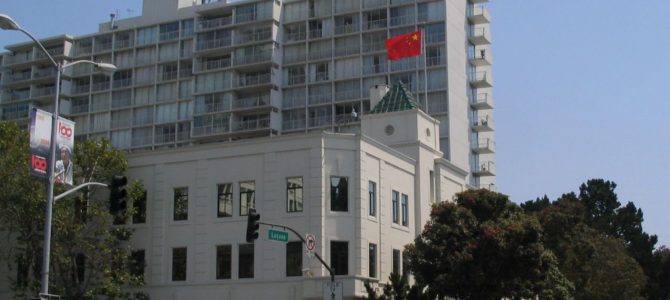
On Sept. 23, Secretary of State Mike Pompeo delivered a speech to the Wisconsin State Senate warning of the Chinese Communist Party’s influence operations targeting state and local officials.
Pompeo began by highlighting an odd incident from February when Wisconsin Senate President Roger Roth received an email from an official in China’s Chicago consulate. The email included language for a resolution that China wanted the senator to pass, with language praising China’s response to the coronavirus. It included such demonstrably false claims, including “Whereas China has been transparent and quick in sharing key information of the virus with the WHO and the international community…”
Roth thought it was a hoax. He deleted the email. A few weeks later, the Chinese consulate tried again, sending, as the consul wrote, “a revised version of the proposed resolution.” Pompeo noted that Roth emailed a one-word response: “Nuts.”
In this case, a member of the Wisconsin legislature resisted the Chinese Communist Party’s entreaty to whitewash its role in a global pandemic. Yet for at least a dozen years, the Chinese Communist Party has worked to make Americans more open to Beijing’s form of authoritarianism. I saw this firsthand in 2009 when I was serving my third and final term in the California State Assembly.
What Happened in California
The occasion was a Tibet Awareness Day resolution by my colleague, Republican Assemblyman Sam Blakeslee. Blakeslee’s son had worked among the considerable Tibet refugee community in India and had invited his father out for a visit. Blakeslee came back with a personal appreciation of Tibet’s history and the repression its people suffer to this day under occupation by the People’s Republic of China.
The year before, Blakeslee had authored a similar resolution, only to see a Democrat pick up the issue and pass a watered-down version. It quietly passed without a roll call vote and had 74 of 80 members of the Assembly listed as coauthors, including eight who went on to serve in Congress: Karen Bass, Julia Brownley, Paul Cook, Mark DeSaulnier, Jared Huffman, Doug La Malfa, Ted Lieu, and Mimi Walters.
Blakeslee offered his Tibet Day resolution again in early 2009. This time, it advanced unanimously on March 2 in the Rules Committee on an 8-0 vote, with Lieu, now a Democrat member of the U.S. House, supporting the resolution.
Within days of the committee approval, dozens of diplomatic staff from the People’s Republic of China flew in from the Los Angeles consulate and drove in from the San Francisco consulate. They met with elected members and staff in a full-court lobbying effort to stop the bill.
The extent of the lobbying effort was so expansive that it attracted the attention of the FBI. An agent visited me and asked if I had been lobbied by the Chinese foreign ministry. I hadn’t, I explained, noting that might have been because I authored a book, “China Attacks,” that had been translated into Chinese and was a bestseller in Taiwan but was banned in the PRC.
On March 16, the Tibet Day resolution came to the floor of the California State Assembly. A resolution that had passed without controversy the previous year was now marked for defeat. The PRC had been caught off guard the year before and wasn’t about to be embarrassed again. A Democratic assemblyman moved to kill the resolution — to “re-refer” it to committee, in the parlance of the House, triggering a floor debate.
I rose to speak, telling the chamber “We have been lobbied by agents who work for the Chinese government,” and “We need to allow democracy to take its course. Anything less would be a travesty of justice in this chamber.”
Democrats Kill the Bill on China’s Behalf
Democrats justified killing the bill. After blocking a planned March 9 vote, Assembly Member Fiona Ma, who voted for the largely similar bill the prior year, said, “Our relationship with [China] is mutually cooperative at this moment, so it is important that we maintain good relationships with our No. 1 partner.”
Before the vote, Chinese consulate representatives, including Consul General Gao Zhansheng, worked the capitol hard, prompting Blakeslee to note this was the only time in five years in office that he saw foreign representatives lobbying in the legislature.
The final vote to re-refer the resolution was 46 to 30, with all the votes to kill the measure coming from majority Democrats, including three current members of Congress who, just the prior year, were cosponsors of the Tibet Day resolution: Bass, Brownley, and Lieu. Jared Huffman, who also supported 2008’s resolution, abstained.
Wait, There’s More
After the PRC so blatantly “interfered in the internal affairs” of another nation under Gao’s direction—something that the Chinese Communist Party constantly warns other nations not to do in China—something remarkable happed in Oregon’s legislature. As Gao was leaving his post, the Oregon legislature passed a concurrent resolution honoring Gao in April 2013.
In part, the resolution declared: “Gao promoted opportunities for Oregon students to study Mandarin Chinese and Chinese culture through the Confucius Classroom program”; “Gao facilitated the visit to Oregon by State Councilor Liu Yandong, the most senior government official from China ever to visit Oregon”; “Gao has supported Oregon’s sustainable development and eco-branding initiatives”; and concluding by praising Gao “for his remarkable service in deepening the person-to-person exchanges between Oregon and the People’s Republic of China.”

Of note here is that the PRC’s Confucius Institutes program is being systematically kicked out of college campuses and classrooms around the world as it has become apparent that is a front to promote Chinese Communist Party propaganda and monitor and keep the Chinese diaspora in line through threats and intimidation.
House Concurrent Resolution 10 was sponsored by House members Jules Bailey, a Democrat, and the late Dennis Richardson, a Republican. Bailey went on run for mayor of Portland as the farther-left candidate against the more moderate Ted Wheeler, then the state treasurer. Wheeler won.
Richardson ran for governor, winning the Republican nomination in 2014 but losing in the general election. The following year, he declared his candidacy for Oregon secretary of state, winning in 2016 and becoming the only Republican to hold statewide office in Oregon.
Of the 60 members of the Oregon House of Representatives, clearly, Bailey and Richardson were among the most prominent. That they would sponsor a resolution in support of the Chinese foreign ministry illustrates China’s successful efforts to cultivate key American allies.
Fortunately, the U.S. State Department issued new rules to curtail the PRC’s efforts to directly influence American politics with official diplomatic personnel. The measures, rolled out three weeks ago, impose the same restraints on the PRC’s diplomats that they impose on ours: requiring approval to host cultural events, meet with local government officials, and visit university campuses.
Because of the PRC’s extensive cultural and business networks, these commonsense restrictions won’t end the Chinese Communist Party’s ability to influence American politics. But the measures will make them less effective.









